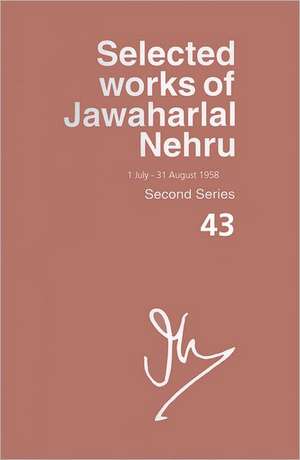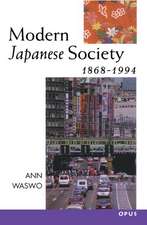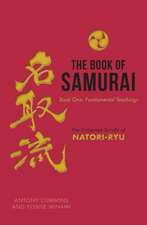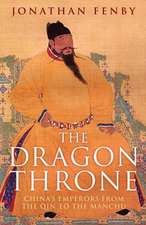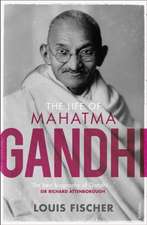Selected Works of Jawaharlal Nehru (1 July-31 August 1958) Second Series, Vol. 43: Explorations in Connected History: Selected Works of Jawaharlal Nehru
Editat de Mridula Mukherjee, Aditya Mukherjeeen Limba Engleză Hardback – 7 sep 2011
The volume starts with a very important note by Jawaharlal Nehru called 'The Basic Approach'. Here we see Nehru agonizing over the complex issues of the day faced by mankind in general and their implications for India. He goes on to flag major issues concerning democracy, capitalism, freedom of the individual, socialism, planning, land reform, health and education. During the period the world was on the brink of a possible major conflagration on account of multiple crises in West Asia and the intervention of the Great Powers. This led to a flurry of diplomatic activity and Presidents and Prime Ministers of all major nations corresponded with him on this issue. Incursions and firings by Pakistan across the eastern border and India-China boundary question continued to trouble Nehru. On the domestic front, food scarcity and inflation, due to drought and floods particularly in north and east India, posed a major challenge. The need to import food impacted adversely the foreign exchange reserves of the country which was already short of funds to finance the Second Five Year Plan. Nehru was quite disturbed and distressed by the developments in Kerala. Amidst all these problems, Nehru found time to spell out the government's policy on the promotion, protection of Urdu. He also instructed the cabinet secretary to streamline the procedures, reduce the size and improve the efficiency of the administrative machinery. He also explained his views on the position and role of the Governor, education, cooperatives, community development schemes and the need to enhance productivity.
This book will interest scholars, teachers, and students of modern Indian history, politics, economics, and all those interested in the Nehruvian era and international relations.
Preț: 360.84 lei
Nou
Puncte Express: 541
Preț estimativ în valută:
69.04€ • 72.09$ • 57.14£
69.04€ • 72.09$ • 57.14£
Carte tipărită la comandă
Livrare economică 03-09 aprilie
Preluare comenzi: 021 569.72.76
Specificații
ISBN-13: 9780198077190
ISBN-10: 019807719X
Pagini: 740
Dimensiuni: 168 x 249 x 51 mm
Greutate: 1.43 kg
Editura: Oxford University Press
Colecția OUP India
Seria Selected Works of Jawaharlal Nehru
Locul publicării:Delhi, India
ISBN-10: 019807719X
Pagini: 740
Dimensiuni: 168 x 249 x 51 mm
Greutate: 1.43 kg
Editura: Oxford University Press
Colecția OUP India
Seria Selected Works of Jawaharlal Nehru
Locul publicării:Delhi, India
Descriere
Part of the Selected Works of Jawaharlal Nehru series, this volume includes lectures, writings, letters, speeches, and other literary works of Nehru from1 July to 31 August 1958. The volume starts with a very important note by Jawaharlal Nehru called 'The Basic Approach'. Here we see Nehru agonizing over the complex issues of the day faced by mankind in general and their implications for India. He goes on to flag major issues concerning democracy, capitalism, freedom of the individual, socialism, planning, land reform, health and education. During the period the world was on the brink of a possible major conflagration on account of multiple crises in West Asia and theintervention of the Great Powers. This led to a flurry of diplomatic activity and Presidents and Prime Ministers of all major nations corresponded with him on this issue. Incursions and firings by Pakistan across the eastern border and India-China boundary question continued to trouble Nehru. On thedomestic front, food scarcity and inflation, due to drought and floods particularly in north and east India, posed a major challenge. The need to import food impacted adversely the foreign exchange reserves of the country which was already short of funds to finance the Second Five Year Plan. Nehru was quite disturbed and distressed by the developments in Kerala. Amidst all these problems, Nehru found time to spell out the government's policy on the promotion, protection of Urdu. He alsoinstructed the cabinet secretary to streamline the procedures, reduce the size and improve the efficiency of the administrative machinery. He also explained his views on the position and role of the Governor, education, cooperatives, community development schemes and the need to enhance productivity. This book will interest scholars, teachers, and students of modern Indian history, politics, economics, and all those interested in the Nehruvian era and international relations.
Notă biografică
Mridula Mukherjee is Director of Nehru Memorial Museum and Library, New Delhi. She is also Professor, Centre for Historical Studies, Jawaharlal Nehru University.Aditya Mukherjee is Professor at the Department of History, Jawaharlal Nehru University, New Delhi.
